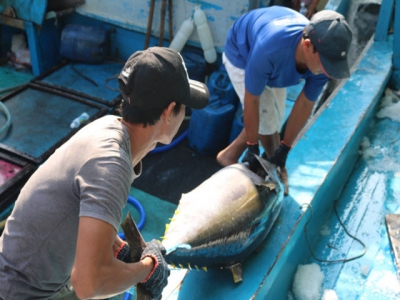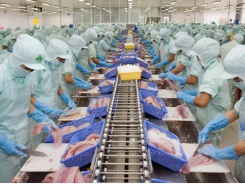Seafood exports to lose up to US$ 500 million if penalized red card by EU

Up to now, Vietnam’s efforts to get rid of yellow card is highly appreciated by EU. Fishermen have shown consciousness and responsibilities towards a sustainable fishing.
Exports decrease
On August 10, Vietnam Association of Seafood Exporters and Producers (VASEP) collaborated with the World Bank to organize an online workshop announcing the report named “A Trade-based analysis of Economic impact on non-compliance with Illegal, Unreported and Unregulated Fishing: The Case of Vietnam”.
Seafood is the fifth biggest export of Vietnam, accounting for 4% of export turnover. In recent years, Vietnam’s seafood export turnover ranges from US$ 8.5 to 9 billion a year, of which aquaculture contributes 60-65% and capture fisheries account for the rest.
Vietnam is the third biggest seafood export country in the world and in recent yearshave focused on developing the sustainable fisheries.
Even though, Vietnam is facing a big challenging related to the yellow card from European Commission (EC) since October 2017, as the country has not worked enough to prevent illegal, unreported and unregulated fishing (IUU).
Because of the yellow card, exports of seafood to Europe decrease continuously from 2017 till now. In the period of 2017-2019, seafood exports to European Union decreased 12%, equivalent to US$ 183.5 million.
This trend lasted to the year 2020, the yellow card and the impact of Covid-19 pandemic plus the leaving EU of United Kingdom and Northern Ireland affected heavily to the seafood exports with a decrease of 5.7% compared to 2019 and reached only US$ 959 million.
Since 2019, EU dropped from the second place to the fourth of all the seafood exporting markets of Vietnam, after the U.S, Japan and China. However, EU is still a big market that makes orientation and guidance to other markets besides being an important partner of Vietnam’s seafood industry.
At this time, Vietnam seafood industry risks losing the EU’s market if the industry is issued red card from the EC due to the failure in addressing the requirements for combating IUU fishing to remove the yellow card and in putting forward related powerful solutions.
In order to have a comprehensive assessment of the possible risks, VASEP collaborating with experts from Nha Trang University and Copenhagen Business School from Denmark worked on the report “A Trade-based analysis of Economic impact on non-compliance with Illegal, Unreported and Unregulated Fishing: The Case of Vietnam”.
The analysis reveals that capture fisheries are directly affected from the IUU regulations and carding process, while aquaculture is subject to indirect impacts. In case Vietnam were issued a red card from the EU, the immediate and short-term impact on Vietnam’s seafood industry would be a trade ban from the EC if the country fails to address the requirements for combating IUU fishing.
In total, the Vietnam seafood industry would immediately lose the EU markets, an export value of nearly US$ 480 million. It is estimated that the Vietnam capture fisheries which includes tuna, swordfish, mollusk, cephalopod and other marine species, would lose around USD 387 million per year.
The indirect impacts for aquaculture stem from an increasingly negative reputation, the increasing burden of custom control, and missing the opportunities to take advantage of the Vietnam - European Union Free Trade Agreement (EVFTA)’s preferential tax levels.
The aquaculture sector could lose around US$ 93 million from these indirect impacts. The medium-term impact if the ban lasted for 2-3 years would mean the disruption of the Vietnamese seafood sector, as a result of which there could be a decline of at least 30 percent in earnings for capture fisheries.
The report also reviews the new challenges faced by the seafood industry as a result of the Covid-19 pandemic and finds that addressing the IUU yellow card and taking advantage of other opportunities can minimize the impact.
If Vietnam can remove the IUU yellow card soon, take advantage of tariff preferences and institutional changes from EVFTA, and the opportunity to recover and grow back in the EU market, it would be feasible for Vietnam to achieve export of around US$ 1.2-1.4 billion in the coming years.
This shows the need for reasonable and effective solutions to quickly overcome the yellow card. Doing so could bring the fishery industry closer to achieving the annual growth target of 7 to 9% in exports and reaching USD 16-18 billion for export by 2030 as well as contribute greatly to the development of sustainable fisheries.
Do not tolerate with violation
Deputy Minister of the Ministry of Agriculture and Rural Development (MARD), Mr. Phung Duc Tien highly appreciates the results reported by VASEP and WB, giving helpful information of the economic impacts on non-compliance with IUU, especially relating to the peculiarities of Vietnam’s fisheries.
Due to the situation of Covid-19 pandemic, since 2020, EC’s delegation could not go to Vietnam to inspect the realities, that is why MARD has updated information regularly, reported the implementation of 4 groups of EC’s recommendations including: Legal framework; Monitoring, inspecting and controlling fishing vessel activities, fleet management; Certification of output and traceability of aquatic products from capture; Law enforcement.
“The EC continues to highly appreciate Vietnam’s commitments, political determination, efforts, and the progresses in implementing to get rid of the IUU yellow card. They also highly appreciate the synchronous works of ministries, sectors, localities, industry associations and the serious responsibilities of fishermen towards the sustainable fisheries”, said Mr. Phung Duc Tien.
MARD asks VASEP and its members cooperating and joining hands with the government to support resources and to combat the IUU fishing; refusing to buy, process, export fishing products of IUU fishing.
MARD clearly affirms that, it will strictly work according to the law to deal with enterprises, groups, individuals abetting, tolerating and violating the IUU regulations.
Deputy Minister Phung Duc Tien proposes the WB to continue supporting to invest in upgrading fishing infrastructure, so that Vietnam can meet the EC’s regulations for localities.
So far, the penalizing of ships that do not comply with the anti-IUU fishing regulations under the new Penalizing Decree has undergone many positive changes. Localities have performed their tasks fiercer and more synchronous. In 2020, there were 2,468 ships fined for violating IUU regulations, with the amount of over VND 61 billion, among that many ships fined with the highest fine of VND 1 billion.
Deputy Minister of MARD, Mr. Phung Duc Tien
Related news
Tools

Phối trộn thức ăn chăn nuôi

Pha dung dịch thủy canh

Định mức cho tôm ăn

Phối trộn phân bón NPK

Xác định tỷ lệ tôm sống

Chuyển đổi đơn vị phân bón

Xác định công suất sục khí

Chuyển đổi đơn vị tôm

Tính diện tích nhà kính

Tính thể tích ao



 It is recommended to choose one of two…
It is recommended to choose one of two…  Vietnam’s shrimp exports rake in US$1.7 billion H1
Vietnam’s shrimp exports rake in US$1.7 billion H1